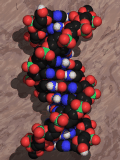

What types of mutations affect the protein?
Where can additional information be found about mutations
in the HNPCC protein?
Why do these mutations lead to cancer?
What types of mutations affect the protein?
 |
There are many studies that have isolated different
DNA errors that could be responsible for the mutated MLH1 gene. Usually
the same mutation will be passed through a family, though different families
may have different DNA errors that lead to the same tumors. Some of these
DNA mutations are listed below. (Ref. 11)
|
MLH1, SER252TER In codon 252, an A instead of a C results in the substitution of a stop codon for serine. This significantly changes the size of the protein. (Ref. 2)
MLH1, SER44PHE On an exon encoding the highly conserved amino acids 41 to 69, a C to T substitution results in a change from serine to phenylalaine. This change significantly changes the shape of the protein. (Ref. 2).
MLH1, IVS5AS, G-A, -1, EX6 DEL, FS, TER The improper function of the protein is caused by a combination of errors resulting from a single mutation. A single base pair mutation in one intron leads to the deletion of the 92 base pairs, including exon 6. As well as the deletion of the exon, a frameshift occurs that leads to a stop codon just 24 base pairs down stream. (Ref. 2)
MLH1, 3.5-KB DEL A large deletion, including sections of exon 15 and portions of introns 15, 16, and 17, creates an incomplete protein that cannot function properly. This deletion may result from a recombination between repeated Alu elements in intron 15 and another in intron 17 (Ref. 2).
MLH1, HIS329PRO A single base pair substitution causes the histidine amino acid at position 329 to be replaced with proline. This change affects the interaction of the amino acids in protein folding, ultimately disrupting the protein's shape (Ref. 2).
Slowly, researchers are determining which of these mutation lead to Lynch syndrome I and which lead to Lynch syndrome II.
Where can additional information be found about mutations in the HNPCC protein?
The reason that colon tumors in HNPCC patients are the same as those in patients with sporadic colon cancers is that they are the result of the same mutations. Because the DNA repair process does not function properly in HNPCC carriers, patients have a much higher chance of having mutations in their DNA. These may be the same mutations that occur in many other people, but the other people are able to repair the mutations effectively. Patients with sporadic cancer have the same mutations as HNPCC patients. The only difference is that the HNPCC patient has increased risk since mutations in the DNA are not corrected. In some respects it can be said that the sporadic cancer patient has extremely bad luck because their mutation that led to colon cancer should have been corrected by DNA repair. However, not even DNA repair mechanisms are perfect.
Unfortunately the actual cause of tumor growth and
why it is usually seen in the colon or neighboring organs, is not yet understood.
More research is necessary to answer these important questions.
|